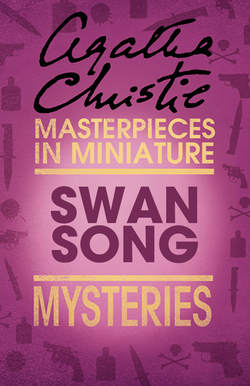Читать книгу Swan Song: An Agatha Christie Short Story - Агата Кристи, Agatha Christie, Detection Club The - Страница 5
Swan Song
Оглавление‘Swan Song’ was first published in Grand Magazine, September 1926.
It was eleven o’clock on a May morning in London. Mr Cowan was looking out of the window, behind him was the somewhat ornate splendour of a sitting-room in a suite at the Ritz Hotel. The suite in question had been reserved for Mme Paula Nazorkoff, the famous operatic star, who had just arrived in London. Mr Cowan, who was Madame’s principal man of business, was awaiting an interview with the lady. He turned his head suddenly as the door opened, but it was only Miss Read, Mme Nazorkoff’s secretary, a pale girl with an efficient mïïanner.
‘Oh, so it’s you, my dear,’ said Mr Cowan. ‘Madame not up yet, eh?’
Miss Read shook her head.
‘She told me to come round at ten o’clock,’ Mr Cowan said. ‘I have been waiting an hour.’
He displayed neither resentment nor surprise. Mr Cowan was indeed accustomed to the vagaries of the artistic temperament. He was a tall man, clean-shaven, with a frame rather too well covered, and clothes that were rather too faultless. His hair was very black and shining, and his teeth were aggressively white. When he spoke, he had a way of slurring his ‘s’s’ which was not quite a lisp, but came perilously near to it. It required no stretch of imagination to realize that his father’s name had probably been Cohen. At that minute a door at the other side of the room opened, and a trim, French girl hurried through.
‘Madame getting up?’ inquired Cowan hopefully. ‘Tell us the news, Elise.’
Elise immediately elevated both hands to heaven.
‘Madame she is like seventeen devils this morning, nothing pleases her! The beautiful yellow roses which monsieur sent to her last night, she says they are all very well for New York, but that it is imbecile to send them to her in London. In London, she says, red roses are the only things possible, and straight away she opens the door, and precipitates the yellow roses into the passage, where they descend upon a monsieur, très comme il faut, a military gentleman, I think, and he is justly indignant, that one!’
Cowan raised his eyebrows, but displayed no other signs of emotion. Then he took from his pocket a small memorandum book and pencilled in it the words ‘red roses’.
Elise hurried out through the other door, and Cowan turned once more to the window. Vera Read sat down at the desk, and began opening letters and sorting them. Ten minutes passed in silence, and then the door of the bedroom burst open, and Paula Nazorkoff flamed into the room. Her immediate effect upon it was to make it seem smaller, Vera Read appeared more colourless, and Cowan retreated into a mere figure in the background.
‘Ah, ha! My children,’ said the prima donna, ‘am I not punctual?’
She was a tall woman, and for a singer not unduly fat. Her arms and legs were still slender, and her neck was a beautiful column. Her hair, which was coiled in a great roll half-way down her neck, was of a dark, glowing red. If it owed some at least of its colour to henna, the result was none the less effective. She was not a young woman, forty at least, but the lines of her face were still lovely, though the skin was loosened and wrinkled round the flashing, dark eyes. She had the laugh of a child, the digestion of an ostrich, and the temper of a fiend, and she was acknowledged to be the greatest dramatic soprano of her day. She turned directly upon Cowan.
‘Have you done as I asked you? Have you taken that abominable English piano away, and thrown it into the Thames?’
‘I have got another for you,’ said Cowan, and gestured towards where it stood in the corner.
Nazorkoff rushed across to it, and lifted the lid.
‘An Erard,’ she said, ‘that is better. Now let us see.’
The beautiful soprano voice rang out in an arpeggio, then it ran lightly up and down the scale twice, then took a soft little run up to a high note, held it, its volume swelling louder and louder, then softened again till it died away in nothingness.
‘Ah!’ said Paula Nazorkoff in naïve satisfaction. ‘What a beautiful voice I have! Even in London I have a beautiful voice.’
‘That is so,’ agreed Cowan in hearty congratulation. ‘And you bet London is going to fall for you all right, just as New York did.’
‘You think so?’ queried the singer.
There was a slight smile on her lips, and it was evident that for her the question was a mere commonplace.
‘Sure thing,’ said Cowan.
Paula Nazorkoff closed the piano lid down and walked across to the table, with that slow undulating walk that proved so effective on the stage.
‘Well, well,’ she said, ‘let us get to business. You have all the arrangements there, my friend?’
Cowan took some papers out of the portfolio he had laid on a chair.
‘Nothing has been altered much,’ he remarked. ‘You will sing five times at Covent Garden, three times in Tosca, twice in Aida.’
‘Aida! Pah,’ said the prima donna; ‘it will be unutterable boredom. Tosca, that is different.’
‘Ah, yes,’ said Cowan. ‘Tosca is your part.’
Paula Nazorkoff drew herself up.
‘I am the greatest Tosca in the world,’ she said simply.
‘That is so,’ agreed Cowan. ‘No one can touch you.’
‘Roscari will sing “Scarpia”, I suppose?’
Cowan nodded.
‘And Emile Lippi.’
‘What?’ shrieked Nazorkoff. ‘Lippi, that hideous little barking frog, croak – croak – croak. I will not sing with him, I will bite him, I will scratch his face.’
